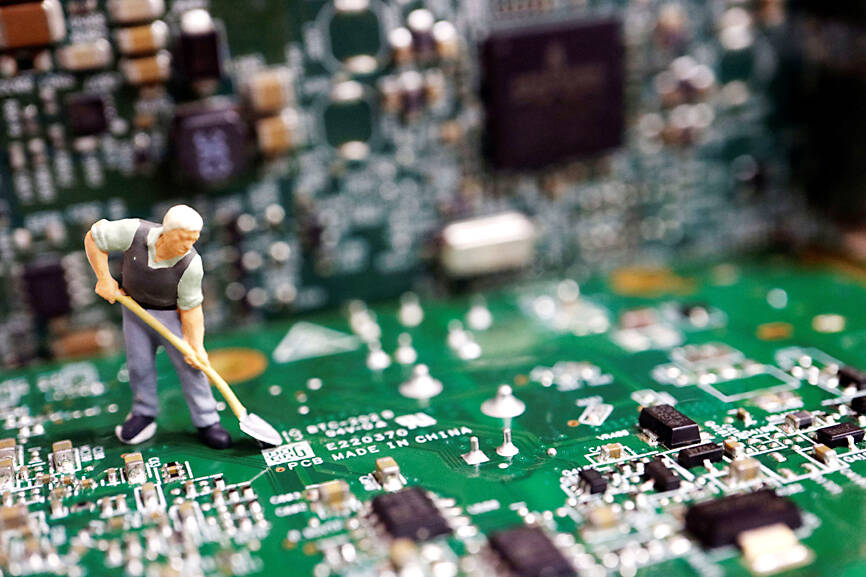Any attempt by the incoming administration of US president-elect Donald Trump to impose tariffs on BRICS countries for trying to create a new currency or use alternatives to the US dollar could cause global semiconductor supply chain disruptions, Malaysia said yesterday.
The BRICS grouping of major emerging economies was initially Brazil, Russia, India and China, and has since expanded to take in other countries.
Malaysia has applied to be part of the bloc, but has not yet been officially accepted as a member. The Southeast Asian nation is a major semiconductor hub which accounts for about 13 percent of global chip testing and packaging.

Photo: REUTERS
Malaysian Minister of Investment, Trade and Industry Tengku Zafrul Aziz said the country is closely monitoring developments after Trump said BRICS members would face 100 percent tariffs unless they committed to not creating a new currency or supporting another currency that would replace the US dollar.
The US is Malaysia’s third-largest trade partner, and US firms are the main investors in its semiconductor sector, the minister said.
“As such, any move to impose a 100 percent tariff will only harm both parties which are depending on each other for efforts to prevent disruptions in the global supply chain,” he said in a parliamentary reply.
While BRICS countries have discussed reducing reliance on traditional trade currencies such as the US dollar, there has been no official decision made on de-dollarization efforts, he added.
On Monday, Russia said any US attempt to compel countries to use the greenback would backfire and only strengthen efforts among countries to switch to national currencies in trade.

With an approval rating of just two percent, Peruvian President Dina Boluarte might be the world’s most unpopular leader, according to pollsters. Protests greeted her rise to power 29 months ago, and have marked her entire term — joined by assorted scandals, investigations, controversies and a surge in gang violence. The 63-year-old is the target of a dozen probes, including for her alleged failure to declare gifts of luxury jewels and watches, a scandal inevitably dubbed “Rolexgate.” She is also under the microscope for a two-week undeclared absence for nose surgery — which she insists was medical, not cosmetic — and is

CAUTIOUS RECOVERY: While the manufacturing sector returned to growth amid the US-China trade truce, firms remain wary as uncertainty clouds the outlook, the CIER said The local manufacturing sector returned to expansion last month, as the official purchasing managers’ index (PMI) rose 2.1 points to 51.0, driven by a temporary easing in US-China trade tensions, the Chung-Hua Institution for Economic Research (CIER, 中華經濟研究院) said yesterday. The PMI gauges the health of the manufacturing industry, with readings above 50 indicating expansion and those below 50 signaling contraction. “Firms are not as pessimistic as they were in April, but they remain far from optimistic,” CIER president Lien Hsien-ming (連賢明) said at a news conference. The full impact of US tariff decisions is unlikely to become clear until later this month

GROWING CONCERN: Some senior Trump administration officials opposed the UAE expansion over fears that another TSMC project could jeopardize its US investment Taiwan Semiconductor Manufacturing Co (TSMC, 台積電) is evaluating building an advanced production facility in the United Arab Emirates (UAE) and has discussed the possibility with officials in US President Donald Trump’s administration, people familiar with the matter said, in a potentially major bet on the Middle East that would only come to fruition with Washington’s approval. The company has had multiple meetings in the past few months with US Special Envoy to the Middle East Steve Witkoff and officials from MGX, an influential investment vehicle overseen by the UAE president’s brother, the people said. The conversations are a continuation of talks that

CHIP DUTIES: TSMC said it voiced its concerns to Washington about tariffs, telling the US commerce department that it wants ‘fair treatment’ to protect its competitiveness Taiwan Semiconductor Manufacturing Co (TSMC, 台積電) yesterday reiterated robust business prospects for this year as strong artificial intelligence (AI) chip demand from Nvidia Corp and other customers would absorb the impacts of US tariffs. “The impact of tariffs would be indirect, as the custom tax is the importers’ responsibility, not the exporters,” TSMC chairman and chief executive officer C.C. Wei (魏哲家) said at the chipmaker’s annual shareholders’ meeting in Hsinchu City. TSMC’s business could be affected if people become reluctant to buy electronics due to inflated prices, Wei said. In addition, the chipmaker has voiced its concern to the US Department of Commerce